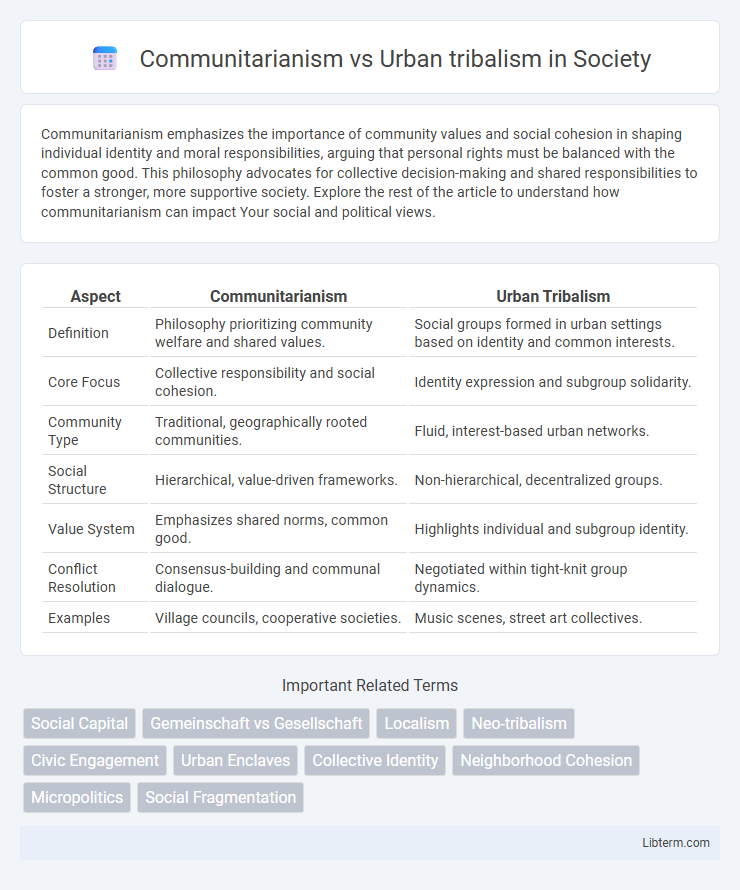Communitarianism emphasizes the importance of community values and social cohesion in shaping individual identity and moral responsibilities, arguing that personal rights must be balanced with the common good. This philosophy advocates for collective decision-making and shared responsibilities to foster a stronger, more supportive society. Explore the rest of the article to understand how communitarianism can impact Your social and political views.
Table of Comparison
| Aspect | Communitarianism | Urban Tribalism |
|---|---|---|
| Definition | Philosophy prioritizing community welfare and shared values. | Social groups formed in urban settings based on identity and common interests. |
| Core Focus | Collective responsibility and social cohesion. | Identity expression and subgroup solidarity. |
| Community Type | Traditional, geographically rooted communities. | Fluid, interest-based urban networks. |
| Social Structure | Hierarchical, value-driven frameworks. | Non-hierarchical, decentralized groups. |
| Value System | Emphasizes shared norms, common good. | Highlights individual and subgroup identity. |
| Conflict Resolution | Consensus-building and communal dialogue. | Negotiated within tight-knit group dynamics. |
| Examples | Village councils, cooperative societies. | Music scenes, street art collectives. |
Defining Communitarianism: Core Principles
Communitarianism emphasizes the importance of community values and social cohesion, advocating that individual rights are balanced with social responsibilities within a collective framework. Core principles include promoting the common good, fostering civic engagement, and encouraging ethical behavior grounded in shared cultural norms and traditions. This philosophy supports strengthening community bonds to create a supportive environment where individuals thrive through mutual cooperation and respect.
Understanding Urban Tribalism: Key Characteristics
Urban tribalism centers on small, tight-knit groups within cities that share common interests, values, or identities, often defined by cultural, social, or recreational ties. Unlike communitarianism, which emphasizes broad civic responsibility and collective well-being within a community, urban tribes prioritize exclusivity, belonging, and distinctive lifestyle expressions. Key characteristics include fluid membership, symbolic group markers, and strong in-group loyalty that shapes social interactions and urban cultural landscapes.
Historical Roots: From Community to Urban Clusters
Communitarianism traces its historical roots to classical philosophy and early social movements that emphasized shared values and collective responsibility within stable, geographically-bound communities. Urban tribalism, emerging from late 20th-century urbanization and social fragmentation, reflects a shift toward informal, fluid group identities that form around shared interests, cultures, or lifestyles within metropolitan clusters. This evolution marks a transition from traditional, place-based community bonds to dynamic, networked social structures in diverse urban environments.
Social Cohesion in Communitarian Societies
Communitarianism emphasizes strong social cohesion through shared values, mutual responsibilities, and collective identity, fostering trust and cooperation among members. In communitarian societies, social bonds are reinforced by common norms and institutions that support social welfare and collective decision-making. This cohesion contrasts with urban tribalism, where fragmented, transient groups often prioritize identity and autonomy over consensus and integration.
Fragmentation and Identity in Urban Tribalism
Urban tribalism manifests as fragmented social groups within cities, characterized by fluid, identity-based clusters rather than cohesive, place-based communities typical of communitarianism. This fragmentation highlights a reliance on symbolic markers such as style, language, and shared interests to forge collective identities, often transcending traditional geographic and social boundaries. The resulting urban tribes prioritize personal expression and belonging through social networks, contrasting sharply with communitarianism's emphasis on stable, shared norms and communal solidarity.
Public Policy Implications: Community vs Tribe
Communitarianism emphasizes public policies that strengthen civic responsibilities, social cohesion, and shared norms within diverse urban populations, fostering inclusive community engagement and equitable resource distribution. Urban tribalism, by contrast, often leads to policies that prioritize exclusive group identity, potentially marginalizing outsiders and exacerbating social fragmentation. Policymakers must balance promoting broad-based communal values with recognizing distinct tribal affiliations to ensure social stability and effective governance in urban settings.
Impact on Urban Governance Models
Communitarianism emphasizes collective responsibility and social cohesion, promoting urban governance models that prioritize local community engagement and participatory decision-making. Urban tribalism, characterized by fragmented social allegiances and identity-based groupings, challenges traditional governance by fostering decentralized, often competing, networks that influence resource allocation and policy implementation. The interplay between these frameworks reshapes urban governance by balancing inclusive civic participation with managing diverse, localized power dynamics.
Group Loyalty and Collective Responsibility
Communitarianism emphasizes group loyalty grounded in shared values, traditions, and social institutions, fostering collective responsibility through active participation and mutual support within the community. Urban tribalism, however, centers on fluid, identity-based groups often defined by lifestyle, interests, or cultural expression, where loyalty is more symbolic and collective responsibility is frequently limited to in-group solidarity rather than broader societal obligations. The distinction lies in communitarianism's institutionalized social cohesion versus urban tribalism's dynamic, sometimes fragmented allegiances.
Challenges of Integration in Urban Settings
Communitarianism emphasizes shared values and collective responsibility, fostering social cohesion through intentional community bonds, while urban tribalism often arises from fragmented, identity-based groups competing for resources and recognition. Challenges of integration in urban settings include balancing diverse cultural identities with a unified social fabric, addressing economic disparities, and overcoming mutual distrust between established communities and emerging urban tribes. Effective integration requires policies that promote inclusive dialogue, equitable resource distribution, and the creation of shared public spaces to bridge the gap between communitarian ideals and urban tribal realities.
Future Prospects: Bridging Communitarianism and Urban Tribalism
Future prospects for bridging communitarianism and urban tribalism hinge on fostering inclusive social frameworks that combine shared values with dynamic cultural identities. Integrating stable community bonds from communitarianism with the fluid, identity-driven networks of urban tribalism can enhance social cohesion and resilience in rapidly changing urban environments. Advancements in digital connectivity and participatory governance models offer promising pathways to harmonize collective responsibility with diverse expression.
Communitarianism Infographic

 libterm.com
libterm.com